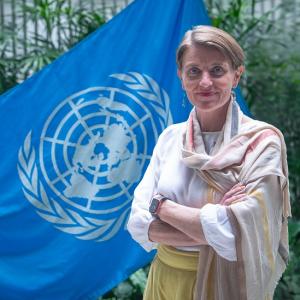Honorable Prime Minister, Her Excellency Sheikh Hasina;
Honorable Minister of Law, Justice and Parliamentary Affairs;
The Chiefs of Army, Naval and Air Force Staff;
The Inspector General of Police;
Secretary, Ministry of Foreign Affairs;
Principal Staff Officer of the Armed Forces Division;
Military Adviser, Office of Military Affairs, UNDPO
Excellencies and esteemed guests;
UN Peacekeepers, former UN Peacekeepers;
And families of the UN Peacekeepers who are present here;
Ladies and Gentlemen;
As'salaamu Alaikum, shubho shokal (good morning in Bangla),
It is a little over a week since I joined the UN family in Bangladesh, and it is an honor and a privilege to participate in this celebration of the International Day of Peacekeeping as my first major public engagement, to recognize the contributions of UN peacekeepers – over a million women and men who have served in 72 UN operations so far, and to pay our respects to the nearly 4,200 peacekeepers who lost their lives in the line of duty since 1948.
Collectively they have touched the lives of millions of people and saved thousands of lives.
I also would like to pay tribute to the contribution of Bangladesh to UN Peacekeeping and thank you for the country’s unwavering commitment to support the UN’s peacekeeping operations.
So far over one lakh, eighty-three thousand (1,83, 378) Bangladeshi peacekeepers have participated in 55 UN missions in 40 countries. Among them are 2,322 female peacekeepers who have successfully completed their missions.
At present Bangladesh is the largest contributor of uniformed personnel in UN peacekeeping operations. Over 6,800 Bangladeshi military and police personnel are currently deployed in the UN operations in Abyei, the Central African Republic, the Democratic Republic of the Congo, Lebanon, Mali, South Sudan, and the Western Sahara. Among them are 519 women peacekeepers who are currently deployed in various operations.
As we celebrate their contributions and the role they have played and continue to play in bringing hope, confidence and solace to many war and conflict-affected communities around the world, I want to remember with deep respect the 135 peacekeepers who were killed in service in the last year. Since May 2021, Bangladesh lost two dedicated peacekeepers, and nine others were injured in the services of peace.
With this mention, I pay my heartfelt tribute to the fallen heroes:
1. Lt. Col. A K M Mahmudul Islam, psc - From the United Nations Multidimensional Integrated Stabilization Mission in the Central African Republic (MINUSCA)
2. L Cpl (OEP) Kafil Mozumdar - From the United Nations Mission in South Sudan (UNMISS).
Alongside, I recognize the immense sacrifice of the families of the fallen heroes – and I want to let them know that we stand with them in their grief. The sacrifices of the fallen peacekeepers and their families must not go in vain.
As we build forward better and stronger from the COVID-19 pandemic, the theme of this year’s UN peacekeepers Day - ‘People Peace Progress: The Power of Partnerships’ is highly relevant in realizing peace across the world, but also helping achieve the Sustainable Development Goals.
While UN peacekeeping is critical for de-escalating violence and creating safe physical spaces for communities, peacekeeping alone cannot fulfil the mandate of sustaining peace.
Strong partnerships with member states, civil society, NGOs, businesses – leaving no one behind - is fundamental to creating inclusive societies and bringing significant improvements in the lives of ordinary people.
In this context, Bangladesh’s vocal support for multilateralism, its leadership on the Culture of Peace resolution, the “Dhaka Peace Declaration” of December 2021, and recent election of the country as Chair of the Peacebuilding Commission are all testaments to the country’s multidimensional support for peace and security.
As conflicts in many different contexts have shown, meaningful dialogue in peace and security must include the voices of women. Bangladesh played a key role in the adoption of UN Security Council Resolution 1325 on Women Peace and Security in 2000 when the country was Chair of the Security Council. In 2019 the country formulated its National Action Plan for Women Peace and Security.
Bangladesh’s 34-year journey in UN Peacekeeping, offers a wealth of experience and expertise that other countries should learn from. The Bangladesh Institute of Peace Support Operation Training (BIPSOT) has been providing training and strengthening professional capacities of peacekeepers, not only Bangladeshis but also peacekeepers from other troop contributing countries; and I am happy to note that the Institute partners with UN Agencies, especially UN Women on creating awareness and enhancing capacities on UN Security Council Resolution 1325 on women peace and security
On behalf of the United Nations in Bangladesh, I applaud the blue helmets – women and men, from Bangladesh and everywhere for their service for peace. We remember and pay earnest tribute to the sacrifices and legacy of the fallen and the injured.
I would like to conclude with a part of the UN Secretary-General’s message on the Day.
I quote
"Around the globe, UN peacekeepers work with Member States, civil society, humanitarians, the media, the communities they serve and many others, to foster peace, protect civilians, promote human rights and the rule of law and improve the lives of millions of people."
Thank you all.




